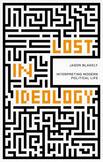Review: Falling out of love with ideology during election season
It’s election season in the United States, and I, like many others, find myself contemplating the weighty question of how people can be so stupid.
I want a sarcastic lawn sign that reads “I’m an IDIOT, and I VOTE,” but I have been too lazy to get one printed up. I have nevertheless recently taken a break from the outrage that fills my email inbox to read Jason Blakely’s new book, Lost in Ideology, and it has been a balm for the soul.
More than just another anodyne admonition to dialogue with one another across political divides, Lost in Ideology lays out a roadmap of contemporary ideologies across the political spectrum, explains their appeal and tries to loosen their grip on us by diagnosing exactly how people get lost in them. Blakely’s hope “is that the reader will fall slightly less in love with their own ideology, and have a more nuanced, if still critical understanding of one that is not their own.”
Blakely likens ideologies to both stories and maps; we need them to make sense of the world. Yet both tend to oversimplify a complex situation and to include some things while excluding others. The same tendency haunts our efforts to understand the ideologies of others. We dismiss rival ideologies as mere products of demographics, class interests or psychological traumas. Blakely tries instead to listen carefully to the stories that each ideology tells to discern what genuine goods it tries to protect and advance. At the same time, he offers tools for criticizing ideologies, tools that come from no particular ideology but apply to them all.
The main such tool is a recognition that ideologies are cultural, similar to other meaning-making activities like literature and theater. Ideologies do not simply reflect the world as it is but help to make the world. Ideologies go bad when they cannot tell their own story as cultural creations but claim instead to be natural, the simple product of reason or science or common sense. Once one regards one’s own view as natural, opposing views are rendered unnatural, perversions that will need correction by force, since their adherents seem immune to reason.
Classical liberalism, for example, saw its view of rights as “self-evident,” in the words of the Declaration of Independence. John Locke’s view is appealing because it promises an anti-paternalistic contract that guarantees equality and self-governance. Locke thought the “state of nature” was one of autonomous individual property holders, but Blakely points out how unnatural would be a human condition without community, kin networks and revealed religion. Native Americans found the idea of private property blasphemous; Locke’s view, Blakely notes, was a perfect fit with the settler colonialism that was remaking the world.
This does not mean that classical liberalism is without merit, but it does mean that liberal agents are a cultural production, not simply a product of nature. This realization could help restrain the imperialism that sees liberalism as the universal destiny of all humankind, to be encouraged or imposed by force as necessary.
Blakely’s dissection of Lockean liberalism takes all of 10 pages. Throughout the book, Blakely displays a remarkable knack for getting to the heart of an ideology in a few deft strokes. For example: Utilitarianism promises a calculus for ethics based on increasing aggregate pleasure, but it results in a technocracy in which “science” is invoked to silence ideological foes. Another example: Civic republicanism invests freedom in communities, not individuals, but thereby risks localist forms of tyranny and racism.
Lost in Ideology is most interesting when it examines the contemporary split of classic liberalisms into left and right. Progressives believe in ever-greater freedom in ever-changing circumstances; they get lost in ideology when they think that everyone will eventually think like them, rendering those who disagree backward and anachronistic. Conservatives believe in defending tradition, but they get lost in ideology when they don’t recognize that traditions change. Traditions are, as Alasdair MacIntyre says, ongoing arguments about what needs to be conserved in any particular circumstances.
The idea that traditions change can in fact be illustrated by the hybridization since the 1960s of conservatism with libertarianism, Main Street with Wall Street. Capitalism’s restless “creative destruction” is anathema to conserving the landscapes, small businesses and small-town values to which conservatives appeal; the logic of “choice” underlies both capitalism and abortion rights.
Trumpism is a hybrid in which nostalgia for the past is harnessed to a desire not to conserve but to overturn. Trump combines conservative and libertarian themes with classic fascism: A once-great people faces peril from enemies, and one exceptional leader can save them. Fascism is both reactionary and revolutionary, and it relies on stories that are mostly untrue. But Blakely strives to understand its appeal, and he recognizes that fascism—like socialism, which he treats in another chapter—is rarely found in pure form but constantly changes and combines with other ideologies.
Marxist socialism, Blakely argues, evolved from an egalitarian ethos to a hierarchical, technocratic bureaucracy because it viewed Marxism as a science rather than a cultural and ethical system, again getting lost in ideology. One reason the scientific view of Marxism lost persuasive power was that capitalism did not behave as Marx predicted; it absorbed many of Marx’s ideas through the welfare state.
Again, ideologies are seldom as pure as they present themselves to be. In the final chapters of Lost in Ideology, Blakely examines nationalism, multiculturalism, feminism and ecological politics and shows how these ideologies often cross left-right boundaries. Nationalism and environmentalism can be of the left or the right; feminists can critique multiculturalism as a cover for Muslim oppression of women. According to Blakely, the left-right taxonomy itself can have ideological purposes, with liberals putting themselves in the sensible middle between fascists and communists.
This book is quite simply the best guide to today’s dominant ideologies. Blakely is concise, sympathetic, insightful, critical and fair. I have a few quibbles along the way: I think Blakely too neatly divides ideologies from “religions,” and nationalism from patriotism. But he practices throughout the general approach that he summarizes in the conclusion. To avoid getting lost in ideology, one must be “multilingual,” able to understand more than one ideology and to understand why someone else’s is attractive.
Blakely does not pretend to have discovered a neutral science from which to judge the various ideologies on offer. In fact, he criticizes empirical political “science”; trying to reduce political analysis to data describing people’s behaviors and beliefs reduces political convictions to a mere irrational act of the will.
Blakely does not deny that we need normative criteria—for a Christian, theological and ethical criteria derived from the Gospel—to construct a worldview and judge ideologies. But his book is a more modest exercise in intellectual humility, of seeing our blind spots. Criticism from outside an ideology can show that a given ideology does not simply describe the way things are; race and ethnicity, for example, are invented, not natural, categories. Internal criticism can point to contradictions—conservativism’s incompatibility with capitalism, for example—or show that an authoritative figure within a tradition is at odds with its ideology, asking, for instance, what Jesus would think of Christian nationalism.
Ideologies are not defeated by simple arguments, but neither are they immune, and some are more vulnerable than others. Blakely is not a relativist who thinks that all ideologies are equally good or bad. His hope is rather that, by loosening the grip of ideologies on each of us, we might be able to see the human beings in each camp: people whose value exceeds their own understanding. It is a timely reminder for election season.











